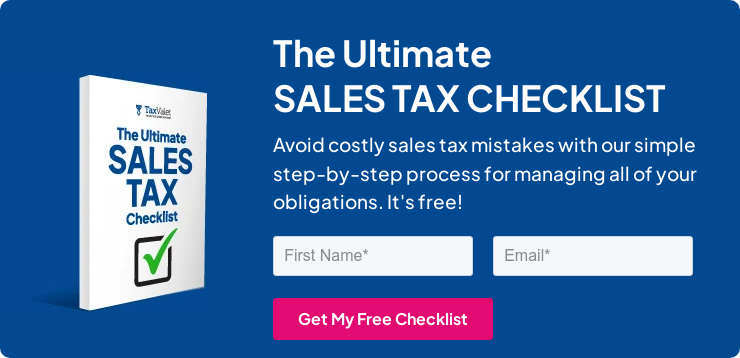Summary: This blog post provides a comprehensive overview of Colorado’s Retail Delivery Fee, outlining its purpose, the businesses it affects, the types of transactions it applies to, its impact on future policies, and the relevant procedures for businesses regarding registration, reporting, and payment.
On July 1, 2022, Colorado introduced a new fee – the Retail Delivery Fee, making it the first state to do so. This unique fee is applied to all deliveries by motor vehicle to a location in Colorado that includes at least one item of taxable tangible personal property. If you’re a retailer, consumer, or simply someone interested in the evolving tax landscape, here’s what you need to know about this pioneering fee.
What is the Colorado Retail Delivery Fee?
The Retail Delivery Fee is a fee imposed on all deliveries by motor vehicle to a location in Colorado with at least one item of taxable tangible personal property subject to state sales or use tax. The fee is due at the same time as your sales tax return, and is generally filed on a monthly basis. It is a state-wide fee, not separated by jurisdiction, and is calculated per sale. More information about the Colorado Retail Delivery Fee can be found on the Colorado Department of Revenue website.
Is the Colorado Retail Delivery Fee a Tax?
It might seem like a trivial distinction, but the Colorado RDF is not considered a tax, it is a fee. Why is this important? Because Colorado requires voter approval on all taxes, however since this is a fee, Colorado’s legislature was able to pass it without voter approval.
Done dealing with sales tax on your own? Meet with an expert and get sales tax off your plate forever. Schedule a Free Sales Tax Plan.
Who Is Subject To The Colorado Retail Delivery Fee?
Any retailer licensed to make sales in Colorado must collect the 27-cent fee on all deliveries made by motor vehicle to a location in Colorado. This includes brick-and-mortar retailers, eCommerce sellers, florists, grocery stores, and restaurants. Deliveries of business-to-business (B2B) retail sales are also subject to the fee, but wholesale sales are exempt.
Small Seller Exemption for Colorado Retail Delivery Fee
SB23-143 created an exemption from the Colorado RDF for a retail delivery by a qualified business, which is a business that has $500,000 or less of retail sales in the prior year or is new, that applies retroactively to when RDFs were first imposed. A purchaser is not eligible for a refund of any RDF that is collected and remitted to the department by a qualified business prior to the effective date of the bill.
What Types Of Transactions Are Subject To The Colorado Retail Delivery Fee?
The fee applies to any delivery containing at least one item that’s subject to Colorado sales tax and made by motor vehicle. This includes alcoholic beverages, appliances, electronics, flowers, food (groceries and takeout), and furniture, among others. If a delivery is subject to the retail delivery fee, the fee applies no matter who owns or operates the vehicle used to deliver the goods: the retailer, a third party, or a shipping company hired by the consumer.
How Is The Fee Broken Down?
The Retail Delivery Fee is composed of six different components, each with its own rate that adds up to the total fee. These components are: Community Access Retail Delivery Fee, Clean Fleet Retail Delivery Fee, Clean Transit Retail Delivery Fee, General Retail Delivery Fee, Bridge and Tunnel Retail Delivery Fee, and Air Pollution Mitigation Retail Delivery Fee. The total fee is $0.27 from July 2022 to June 2023, and it will increase to $0.28 from July 2023 to June 2024.
What Are The Implications Of The Colorado Retail Delivery Fee?
There are a few important aspects to consider regarding the retail delivery fee. First, the fee is not refundable if items are returned, though retailers can choose to refund the fee out of pocket. Second, if a retailer overpays the fee on a previously filed return, they may be able to claim a credit on their current return against the amount owed. Lastly, the fee applies to applicable deliveries made by third parties.
The implementation of the retail delivery fee in Colorado has sparked conversations about its potential impact on future policies. As traditional revenue sources such as fuel taxes dwindle with the rise of electric and hybrid vehicles, governments may look to alternative sources like the retail delivery fee for revenue. While it’s still early to predict the widespread adoption of such a fee, the move by Colorado has certainly added a new dimension to the discourse around taxation and revenue generation.
Conclusion
The Retail Delivery Fee in Colorado represents a novel approach to taxation. It underscores the evolving nature of policy in response to changing consumer behavior and market dynamics. As we continue to monitor the impact of this fee, it provides a valuable case study for other states considering similar measures. As always, retailers, consumers, and stakeholders are advised to stay informed about these changes and understand how they may impact their operations or expenses.
For retailers, the most efficient way to ensure compliance with this new fee is to adapt their invoicing and tax collection systems accordingly. Despite the initial challenges in implementation, over time this could turn out to be an efficient system to fund transportation needs in the state.
While it’s too early to assess the complete impact of this fee, it will undoubtedly play a pivotal role in shaping the future of taxation policies not only in Colorado but potentially across the United States. It will be interesting to see if other states follow Colorado’s lead on this, and if so, how they will choose to implement it.
For more information on the RDF, check out the Colorado Department of Revenue website.

Get in Touch
Company
Disclaimer: Nothing on this page should be considered tax or legal advice. Information provided on this page is general in nature and is provided without warranty.
Copyright TaxValet 2023 | Privacy Policy | Site Map

Disclaimer: Our attorney wanted you to know that no financial, tax, legal advice or opinion is given through this post. All information provided is general in nature and may not apply to your specific situation and is intended for informational and educational purposes only. Information is provided “as is” and without warranty.
What you should do now
- Get a Free Sales Tax Plan and see how Tax Valet can help solve your sales tax challenges.
- Read more articles in our blog.
- If you know someone who’d enjoy this article, share it with them via Facebook, Twitter, LinkedIn, or email.



